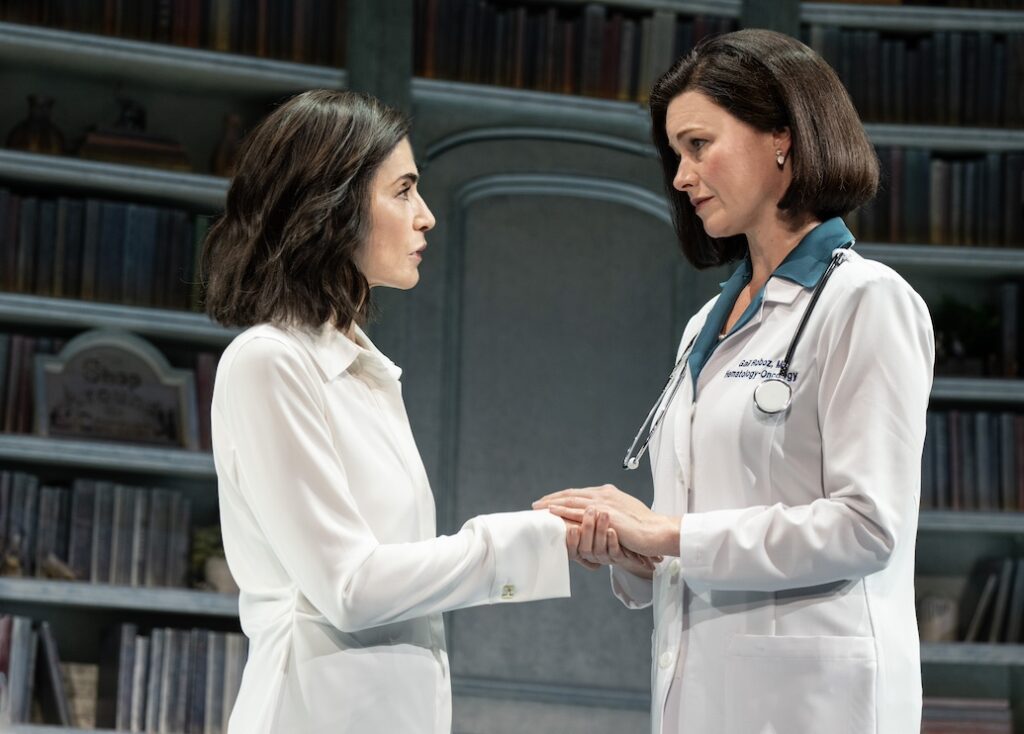Lovers of Chick Flicks Should Be Drawn to Delia Ephron’s Rhapsodic, Autobiographical ‘Left on Tenth’
Director Susan Stroman’s signature is joy, and she draws on her extensive background with musicals to enhance fanciful flourishes that by turns underline and mitigate the play’s sentimentality.

For those who wish that more chick flicks, particularly those focusing on chicks who are no longer spring chickens, were adapted for the stage, have I got a show for you.
The new play “Left on Tenth” was actually adapted from a memoir, but the book and play’s author, Delia Ephron, is noted for her work in film — especially with her celebrated late sister, Nora, with whom Ms. Ephron co-wrote the Tom Hanks and Meg Ryan vehicle “You’ve Got Mail.” The siblings’ credits also include the play “Love, Loss, and What I Wore,” a collection of women’s monologues focusing on fashion and relationships (also based on a book, by Ilene Beckerman).
During its off-Broadway run, between 2009 and 2012, “Love, Loss” became a showcase for actresses over age 40, from acclaimed stage and screen veterans to Rosie O’Donnell and Marla Maples. For “Left on Tenth,” director Susan Stroman has recruited Julianna Margulies, the very attractive, 58-year-old star of “The Good Wife,” to play Delia Ephron — who was in her 70s when the events documented here took place but is described in the script simply as “somewhere north” of 50.
Fair enough: “Left” is, as the character Delia repeatedly reminds us, a romantic comedy, so even if it’s autobiographical, some embellishment is to be expected. Peter Gallager, the slightly older but agelessly handsome theater and film star, is cast as Peter Rutter, the brilliant Jungian psychoanalyst who courts and wins Delia — first via email, eventually in person — after her beloved husband of more than 30 years, fellow writer Jerome Kass, is felled by cancer.

Mind you, pretty much everyone in this show is brilliant, or at least wonderful, in Delia’s estimation: her accomplished and devoted friends; her adorable and doting gay neighbor (played by a charming Peter Francis James, who juggles other roles); the oncologist she describes as “a doctor with a touch of girlfriend” — who will make a discovery that threatens the happy ending for which Peter and Delia seem destined.
Even if this weren’t a true story, it would surely be no spoiler to report that “Left” does end happily, and except for one harrowing scene it retains that spirit throughout. Joy is Ms. Stroman’s signature, and she draws on her extensive background directing and choreographing musicals to enhance fanciful flourishes that by turns underline and mitigate the play’s sentimentality. Ms. Margulies and other cast members dance at points, and Ms. Ephron’s childhood fixation with “Seven Brides for Seven Brothers” is acknowledged in giggly sequences replete with Western costumes, by Jeff Mashie.
Beowulf Boritt’s sleek but cozy set and Jeanette Oi-Suk Yew’s brightly colorful video projection design add to the rhapsodic feel, as does the twinkly incidental music, which with its nods to adult-contemporary pop and older standards would not be out of place in one of Ms. Ephron’s films. Michael Buonincontro contributes scrumptious wig and hair design — particularly for supporting actress Kate MacCluggage, who’s an elegant standout in roles ranging from Delia’s buddies and her stylish oncologist, Dr. Gail Roboz (also a real person), to that laughing bride.
Alas, there is the dialogue, along with Delia’s often gushing narration — which Ms. Margulies delivers gamely, if a bit stiffly at points. My general practice as a critic is to scribble down lines that either delight me or make me cringe, and I had a page full of the latter within the first half hour of this one-act piece. “I should go to rehab for women who can’t stop getting blow dries,” Delia tells us. She describes a friend’s home in Wales as “an ancient farmhouse located at the intersection of eccentricity and beauty.”
Since the milieu is successful Jewish residents of Manhattan, there are references to the tuna sandwiches at Zabar’s and the closing of Barney’s, and Peter, who is predictably charming in Mr. Gallagher’s portrait, speaks of finding his “bashert” (Yiddish for destiny) with Delia. The production also features a pair of irresistibly cute dogs, Dulcé and Charlie (trained by William Berloni, Broadway’s pre-eminent pet provider), who deserve their own bios in the playbill.
That one truly dark scene in the play is, incidentally, buoyed by the easy grace that Mr. Gallagher brings to it — and by the peerless soprano of the late Barbara Cook, captured in a recording of Amanda McBroom’s “Ship in a Bottle.” Nonetheless, I found the passage, like much of “Left on Tenth,” more cloying than heartrending — but then, I’ve never been as much of a sucker for romantic comedy as Delia is.

